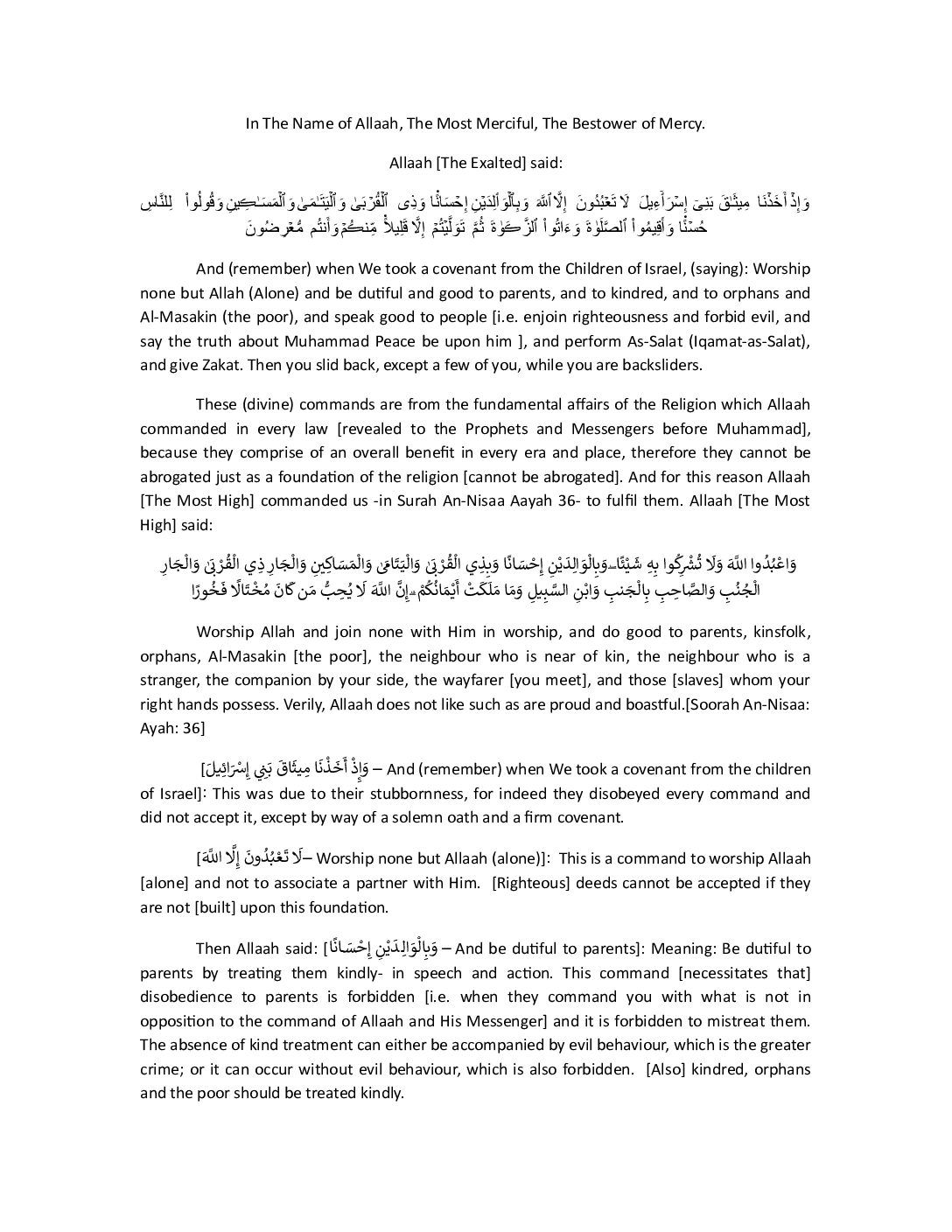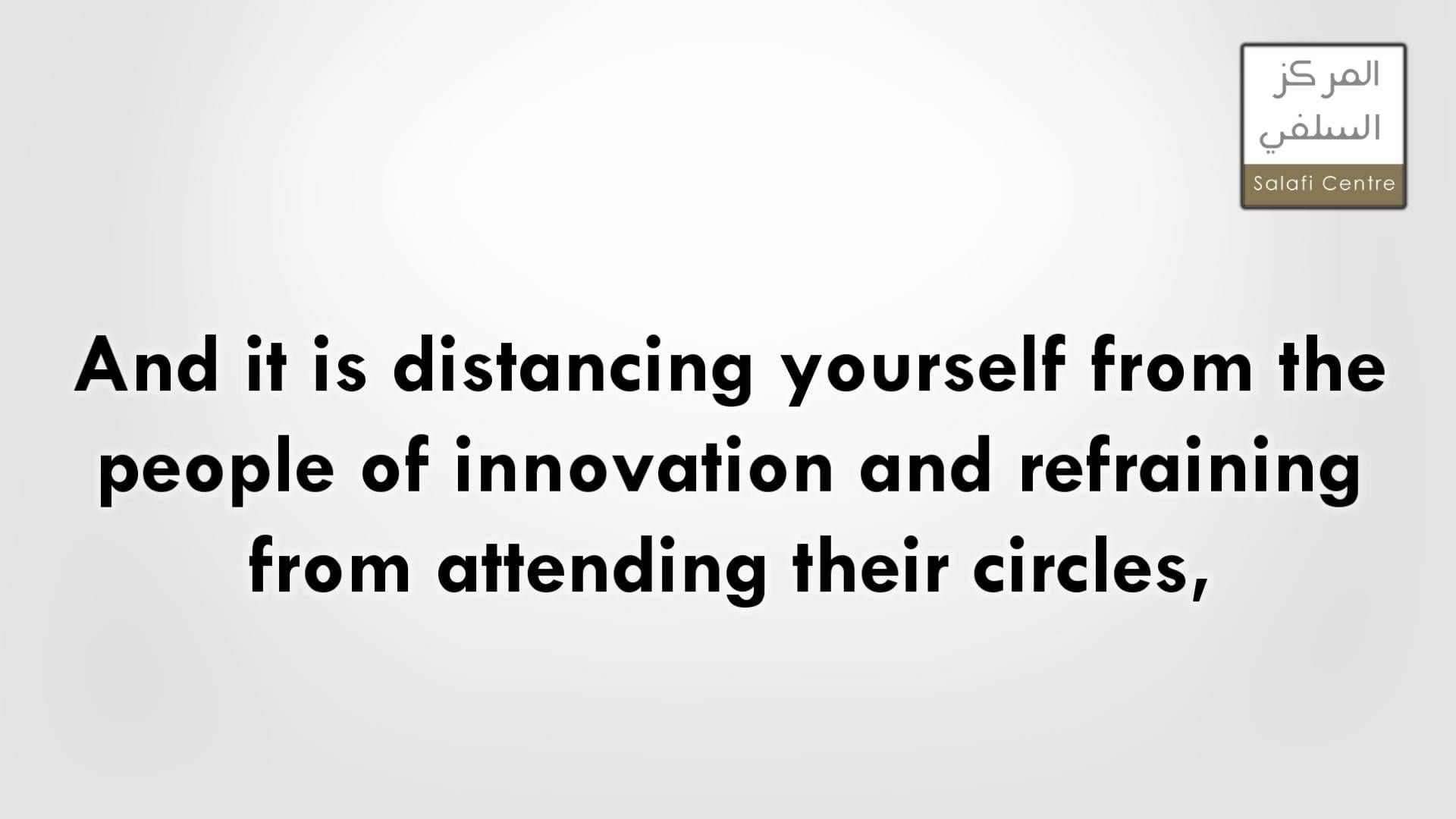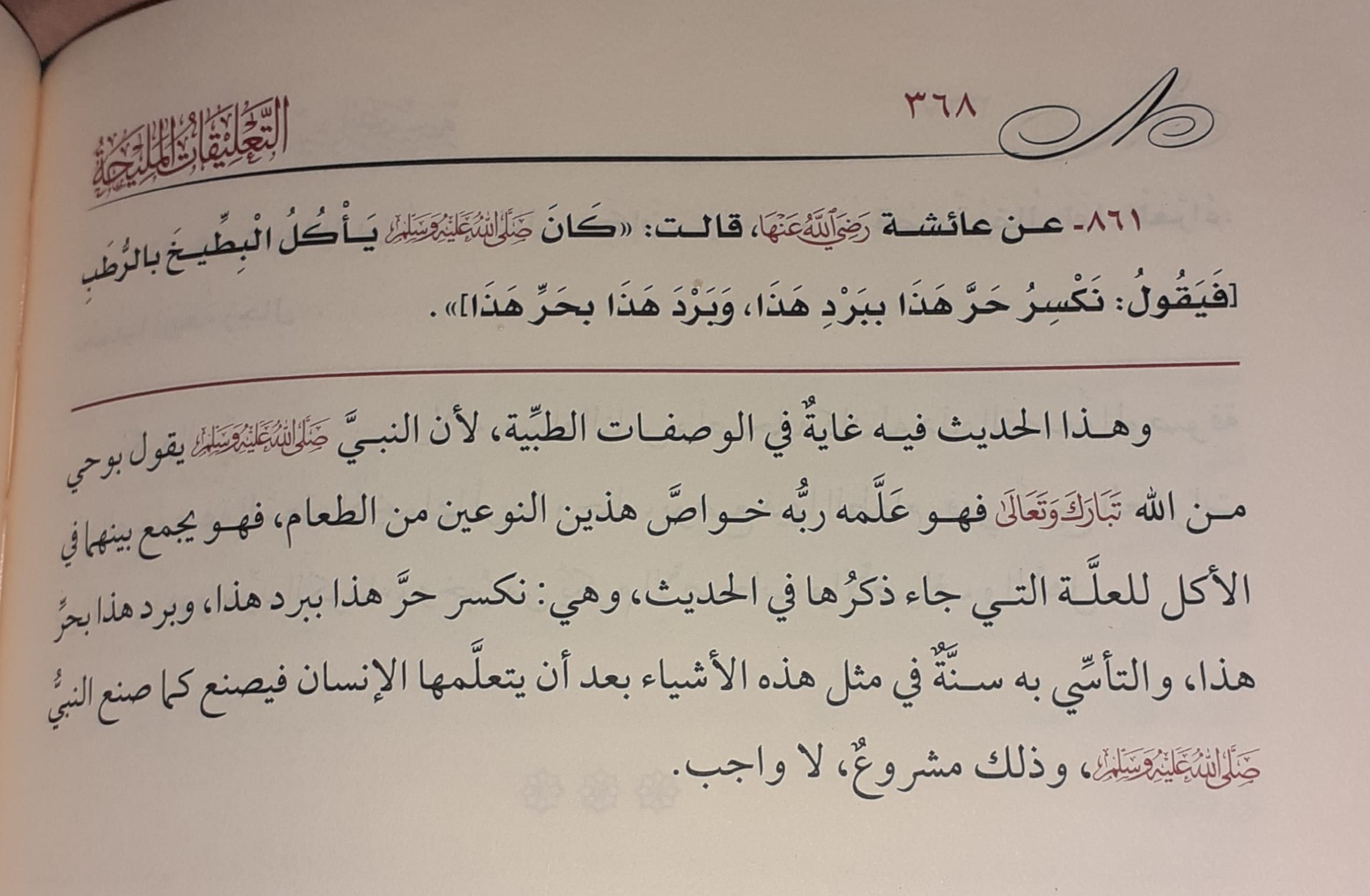In The Name of Allaah, The Most Merciful, The Bestower of Mercy
Imaam Ibnul Qayyim (rahimahullaah) said:
”It is incumbent upon you that (you) detail (affairs) and make a distinction, for unrestricted and general (speech) without clarification has already corrupted the existence and trampled upon the intellects and opinions in every era.”
Shaikh Saaleh Al-Fawzaan (may Allaah preserve him) stated:
There has to be detailed explanation. The one who is not proficient in detailing (an affair) should keep quiet because benefit is not acquired from his speech. And every time error occurs, its cause is due to an absence of detailed explanation between truth and falsehood. So there has to be detailed explanation and distinction and an absence of mixing up (affairs).
Indeed, it may be that there is something of truth and falsehood in an opponent’s statement, so all of it is neither deemed to be false nor truth, rather a distinction is to be made between its truth and falsehood. Therefore, all of it is neither rejected nor accepted; rather a distinction is made between truth and correctness and the falsehood and error in it. And if you are not proficient in detailing (an affair), then you should not enter into this arena. [End of quote. Source: At-Ta’leeqaat Al-Mukhtasar Alaa Al-Qaseedah an-Nooniyyah: Vol: 1 (page: 216)
Indeed, even though Muhammad Al-Maaliki deliberately allowed himself to be blinded and deafened by the flattery, propaganda and lies of the Hizbiyyoon, which led him to utter much nonsense, however – out of good suspicion, even though Muhammad deserves very little- we think that the ranting and raving that overwhelmed him was the result of his failure to detail this important affair. Therefore, we remind ourselves of the following in order to clarify any doubt that may have been disseminated due to Muhammad Al-Maaliki’s lack of detail on that day.
Bidah Al-Mukaffirah and Bidah al-Mufassiqah
Bidah Al-Mukaffirah: It is the Bidah that is tantamount to disbelief. Al-Allaamah Rabee Bin Haadi Al-Madkhali (may Allaah preserve him) was asked whether there is a difference between Bidah Al-Mukaffirah and Bidah Al-Mufassiqah; so Shaikh said that there is Bidah Mukaffirah, such as rejecting the Ruyah (i.e. denying that the believers will see Allaah in the afterlife); rejecting Allaah’s Uluww [i.e. denying that Allaah is above his creation –Allaah ascended over the Throne in a way that benefits his majesty)]; invoking other than Allaah; offering slaughtered sacrifice (i.e. animals) to other than Allaah etc. These are affairs of Bidah Al-Mukaffirah (the bidah that is tantamount to disbelief).
But we do not make Takfeer of the people who commit this type of Bidah until we establish the proofs against them. That is because some of them (i.e. the people who fall into these affairs) carry doubts and are far away from the era of Prophethood and its light (i.e. guidance). So they fall into the likes these innovations.
Rejecting the Ruyah is disbelief; rejecting Allaah’s Uluww is disbelief; the saying that the Qur’aan is created is disbelief-major disbelief. But this person, -[who testifies that none has the right to be worshipped except Allaah and that Muhammad is the messenger of Allaah, and he prays, observes fasting, wants paradise and believes in that] -received the doubts of the people of falsehood, so he falls into the likes of these affairs (i.e. these innovations that are tantamount to disbelief). So we say to him: You have fallen into disbelief and the evidence is this and this, and we clarify for him. So if Allaah grants him Tawfeeq and he returns to the truth, then all praise is due to Allaah. But if not, we declare him a disbeliever after establishing the proofs against him.
As for Bidah Al-Mufassiqah it is other than this (i.e. it is not at the level of that which is tantamount to disbelief)…. [Abridged and paraphrased, see www.rabee.net/ar/questions.php?cat=26&id=484 ]
On the other hand, who are those qualified to make Takfeer?
Question: O Respected Shaykh, who is the murtadd (apostate)? We hope for you to define it in a clear manner, for sometimes the judgement of apostasy can be made upon a person while there is some doubt that he had.
Shaykh Salih al-Fawzaan: The judgement of apostasy and expelling someone from the religion is only appropriate for the people of knowledge who are firmly grounded in knowledge, and they are the judges in the various Shareeah law courts, and those who are able of giving legal verdicts. And this is just like the other matters, and it is not the right of every person, or from the right of those who are learning, or those who ascribe themselves to knowledge, but who have deficiency in understanding. It is not appropriate for them to make judgements of apostasy (upon others). Since, mischief will arise from this, and sometimes a Muslim might be judged as an apostate but he is not actually so. And the takfir of a Muslim who has not committed one of the nullifications of Islaam contains great danger. Whoever says to his brother O Kaafir or O Faasiq, and he is not like that, then the words will fall back upon the one who said them. Hence, the ones who actually judge with apostasy are the legislative judges and those who are able and fit for giving legal verdicts. And as for those who enforce the judgements they are the leaders of the Muslims (wullaat al-amr). As for whatever is other than this, then it is mere confusion.
Question: Some of the students of knowledge are a bit lax towards applying the word of apostasy (riddah) to a Muslim, and this person might sometimes be asked by the Muslims to carry out the hadd punishment for apostasy when the Sultaan does not carry it out upon the one they consider deserves it, the one who has been judged with apostasy.
Shaykh Salih al-Fawzaan: Meting out the punishments is only appropriate for the leader of the Muslims and it is not for every person to establish the punishment, since confusion, and corruption necessarily follows from this, and also the cutting off of the society, tribulations and provocations occur. Establishing the punishments is appropriate (i.e. befits only) to the Muslim leader. The Prophet (sallallaahu alaihi wasallam) said, Pardon each other for the punishments that are between you, but when the execution of the punishment reaches the [authority of the] Sultaan, then Allaah curses both the one who seeks intercession and the one who grants the intercession [i.e. to revoke the punishment].
And from the responsibilities of the Sultaan in Islaam, and from those matters that befit him is the establishment of the punishments after they have been established legislatively, via the Shareeah law courts, upon the one who fell into the crime for which the legislator has designated a specific punishment, such as for stealing. So what has been said is that establishing the punishments (i.e. meting them out) is from the rights of the Sultaan, and when the Muslims do not have a Sultaan amongst them, then they should just suffice with commanding the good and forbidding the evil, and calling to Allaah, the Might and Majestic, with wisdom, good admonition and arguing with that which is best. And it is not permissible for individuals (in the society) to establish the hudood, since that, as we have mentioned, will bring about chaos, and also provocations, and tribulations will arise, and this contains greater corruption than it contains rectification. And from amongst the Shareeah principles that are submitted to is, Repelling the harmful things takes precedence over bringing about the beneficial things. http://www.spubs.com/sps/sp.cfm?subsecID=MNJ09&articleID=MNJ090004&articlePages=1
Finally: Muhammad Al-Maaliki’s statement should not make one heedless of the severity of bidah and its people, even if the bidah is not the one that is tantamount to disbelief. He should have detailed this affair, but obviously he was overwhelmed by that ranting and raving, and flattered by the false praise showered on him by the Hizbiyyoon of Masjid As-Sunnah, which caused him to neglect this important clarification. So do not become negligent like Muhammad Al-Maaliki. Bidah is a serious affair. The following is brief reminder from an article at www.salafipublications.com, as follows…..
Linguistically bid’ah (innovation) means ‘a newly invented matter’. The Sharee’ah definition of bid’ah is: “A newly invented way [beliefs or action] in the religion, in imitation of the Sharee’ah (prescribed Law), by which nearness to Allaah is sought, [but] not being supported by any authentic proof – neither in its foundations, nor in the manner in which it is performed.” Al-I’tisaam of ash-Shaatibee (1/37).
The Messenger of Allaah (sallallaahu alaihi wasallam) said: “Every innovation is misguidance and going astray” Reported by Abu Daawood (no. 4607), at-Tirmidhee (no. 2676) and it is saheeh. Ibn Hajr authenticated it Takhreej Ahaadeeth Ibn ul-Haajib (1/137).
And he (sallallaahu alaihi wasallam) also said: “
and every innovation is misguidance and all misguidance is in the Hellfire.” Reported by an-Nasaa’ee (1/224) from Jaabir bin Abdullaah and it is saheeh as declared by Shaikh ul-Islaam Ibn Taymiyyah in Majmoo’ ul-Fataawaa (3/58).
The Messenger (sallallaahu alaihi wasallam) also warned against the People of Innovation, from befriending, supporting or taking from them saying: “Whoever innovates or accommodates an innovator then upon him is the curse of Allaah, His Angels and the whole of mankind.” Reported by Bukhaaree (12/41) and Muslim (9/140)
And in his footsteps, we find the Noble Companions and the Taabi’een after them warning from the danger of innovations upon the Ummah, its people and their unity, since it is innovations which have divided the Ummah and split it asunder.
Ibn Abbaas (d. 68H) said: “Indeed the most detestable of things to Allaah are the innovations.” Reported by al-Bayhaqee in as-Sunan al-Kubraa (4/316)
Ibn Umar (d. 84H) said: “Every innovation is misguidance, even if the people see it as something good.” Reported by Abu Shaamah (no. 39)
Imaam Muhammad Ibn Saaleh Al-Uthaymeen (rahimahullaah) said: Do not learn from Ahlul Bidah (The people of religious innovations)…see link: http://salaficentre.com/2014/08/do-not-learn-from-ahlul-bidah-even-in-affairs-other-than-aqeedah-shaikh-uthaymeen-rahimahullaah/
Therefore, Muhammad Al-Maaliki should fear Allaah (The Most High) and stopped being a stooge of the UK Hizbiyyoon. He should fear Allaah and stop defending the staunch followers of the Mubtadi’ah [Al-Halabi (Murji Mubtadi); Al-Maghraawi (Takfeeri Mubtadi); Al-Maribi (Ikhwaani Mubtadi) and Al-Hajoori (Haddaadi Mubtadi).
To be continued…In-Shaa-Allaah











